Program Goals
Infants
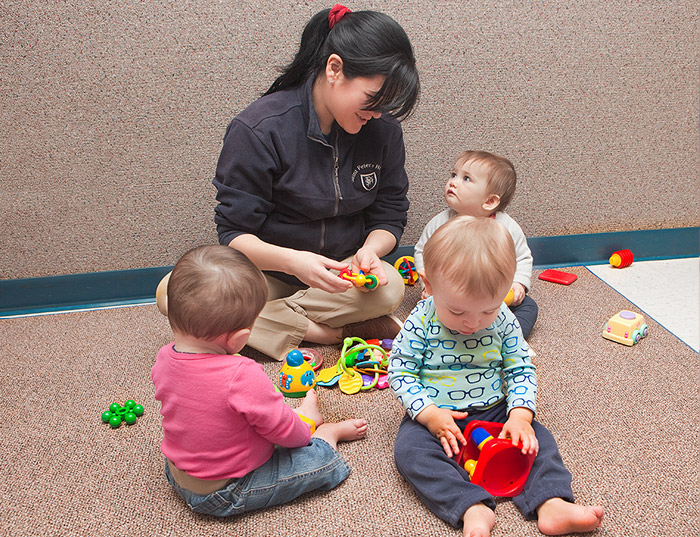
- To care for infants in a warm, affectionate way that lets each child know that they are a special person. This includes the physical affection and cuddling that is so important at this stage of development.
- To meet each child's individual needs completely.
- To implement strict sanitation procedures that are adhered to faithfully.
- To provide opportunities for exploration, learning, and social interaction through a variety of daily activities.
- To prepare activities to stimulate the senses, recognizing that infants learn through the use of their eyes, ears, fingers, and sense of taste and smell.
- To care for children in small groups, preventing over stimulation, disorder and providing opportunities for one-on-one interaction between the children and staff.
- To provide opportunity for the use of large and small motor skills and the opportunity to stimulate these skills during outdoor activities.
- To establish awareness among staff that always provides for a safe environment.
- To provide a certain consistency between Day Care and Home Care practices that will be most beneficial to the infant and will offer the parents an opportunity to influence the kind of care their child receives.
- To establish an observation system in which notes on children are kept.
- To be tactful, discreet, and honest when communicating with parents.
- To develop staff potential through proper supervision by making expectations clear, following through to see that expectations are met, and utilizing staff input and the abilities.
- To grow spiritually and be a Christian role model to other staff members, the children and parents.
Toddlers
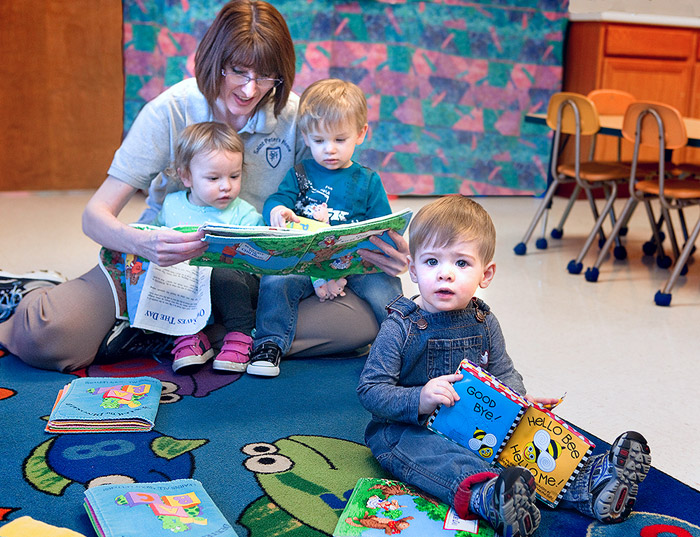
- To provide a loving, caring atmosphere where physical affection is freely given. To instill in each child a feeling of autonomy and positive self-concept.
- To provide a joyful, enthusiastic and spontaneous approach with the children.
- To meet each child's physical needs.
- To establish the foundation for respect of equipment.
- To establish the foundation for respect of others - Social Development.
- To provide for the language development that is so important at this stage of development.
- To make available a good variety of quality material on the shelves at the child's level. (Manipulative, dramatic play, pull toys)
- To provide ample opportunities for use of gross motor skills.
- To provide a variety of activities that begin to introduce the curriculum areas of: art, science, dramatic play, manipulative activities, language, large motor, music and movement.
- To be tactful, discreet, and honest when communicating with the parents.
- To develop staff potential through proper supervision by making expectations clear, following through to see that expectations are met, and utilizing staff input and the abilities.
- To develop self-help skills in order to create a feeling of independence and confidence in the child (this can be accomplished by toilet training, encouraging them to try to help dress themselves and letting them help)
- To provide care in smaller subgroups, in order to give each child more personal attention, to prevent under and over stimulation, to allow more freedom of choices and to maintain a more relaxed atmosphere.
- To promote spiritual growth in the children through blessings at lunch and snack, Bible stories, finger plays, and songs about God's love for us and our gift of salvation.
Two-Year Olds
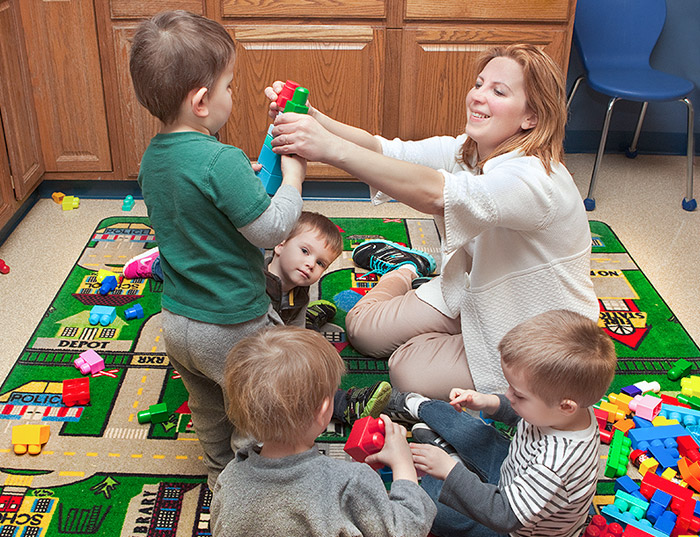
- To provide a wide variety of age appropriate activities, within a routine, that draw from curriculum areas of: art, math, science, music and movement, large muscle, practical life, social studies, dramatic play, language arts, and manipulative activities.
- To provide a nurturing, flexible, and calm atmosphere where physical affection is freely given, self-concept is enhanced, independence is encouraged and expectations are made clear.
- To develop staff potential through proper supervision by making expectations clear, following through to see that expectations are met, and utilizing staff input and their abilities.
- To be tactful, discreet, and honest when communicating with parents.
- To establish room awareness among staff so that a safe environment is always present both indoors and out.
- To meet each child's physical need while setting the stage for future independence in self-care.
- To provide ample opportunity for the use of large motor skills and outdoor activity.
- To provide an atmosphere where the foundations of respect for others is established.
- To encourage social development through cooperative play.
- To establish respect for equipment and materials
- To establish an observation system in which notes on children are kept.
- To develop spiritual growth in children through blessings at lunch and snack, Bible stories, finger plays and songs about God's love for us. The teacher's discipline and attitude should be reflective of her Christian beliefs.
Three-Year Olds
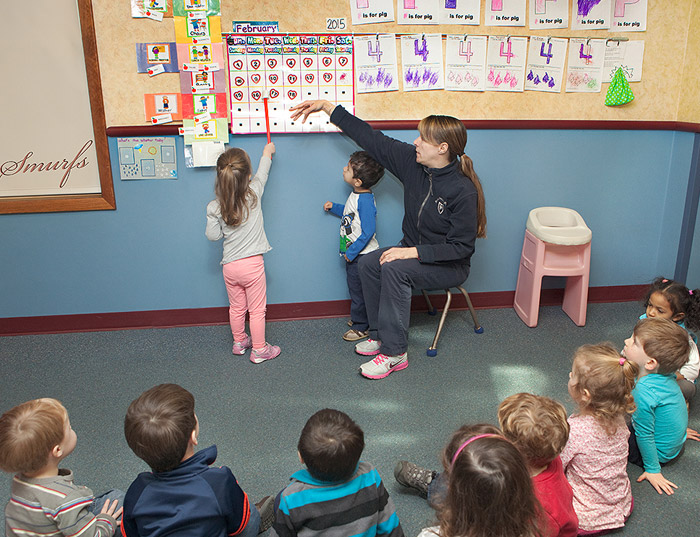
- To promote emotional growth
- To build self-confidence and a sense of self-worth by allowing choices within limits and to build in successful experiences.
- To provide a warm accepting environment for children to work and play in.
- To encourage curiosity and a sense of wonder with emphasis on self-motivation.
- To promote social growth
- To promote and instill a sense of caring for and sensitivity towards others.
- Recognition of group needs vs. individual differences.
- To promote intellectual growth
- To instill a sense of curiosity.
- To provide an atmosphere where children discover and explore. To teach independence through teaching HOW and WHERE to find solutions
- To provide a wide variety of activities within a routine where cooperative play is encouraged. Curriculum areas of art, math, science, music and movement, large motor skills, practical life, dramatic play, language arts and fine motor activities. Through these activities, children are learning to be able to trust their own feelings about what they learn, hear, see and do to begin sharing these experiences with others.
- To promote physical development
- For children to use their bodies in a variety of active ways by participating in fine and large motor activities both indoor and outdoor.
- To promote spiritual growth in the children through the teaching of Bible stories, blessings at lunch and snack time, songs, and teach attitudes.
Four and Five-Year Olds
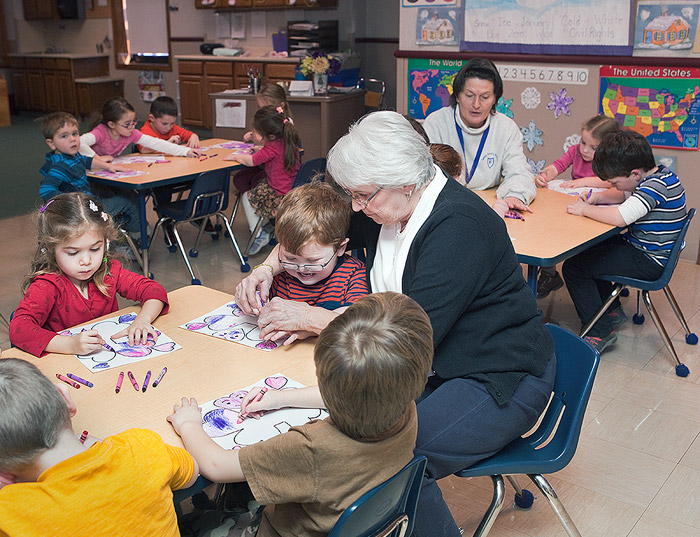
- To meet each child's physical needs while encouraging independence in self-care.
- To provide an atmosphere in which children have respect for others.
- To establish respect for the equipment and materials.
- To provide a relaxed, loving, and calm atmosphere where self-concept is enhanced, independence and choices are encouraged, and self-discipline is gained in an environment where he/she knows the limits and expectations.
- To provide a wide variety of activities within a routine, where cooperative play is encouraged. These activities should be drawn from the curriculum areas of: art, math, science, music and movement, large muscle, social studies, practical life, dramatic play, language arts, and manipulative activities.
- To develop in the child an active curiosity about the world in which he/she lives and an enthusiasm for learning which stimulates exploratory behavior and creativity.
- To develop each child an appreciation for beauty and nature.
- To provide ample opportunity for the use of large motor skills and coordination through physically active play either indoor or outdoor activity.
- To establish room awareness among staff so that a safe environment is always present both indoors and out.
- To be tactful, discreet, and honest in communicating with parents.
- To develop staff potential through proper supervision by making expectations clear, following through to see that expectations are met, and utilizing staff input and their abilities.
- To promote spiritual growth in the children through the teaching of Bible stories, blessing at lunch or snack time, songs, and teacher attitudes.





